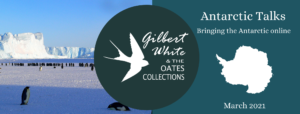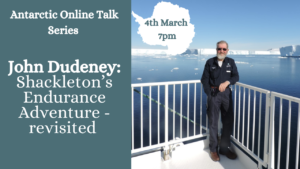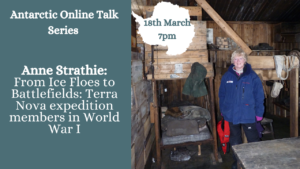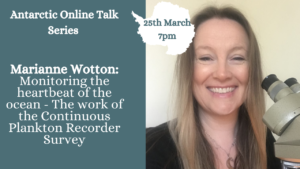This year we are holding our Antarctic Series a little differently! Same wonderful speakers, same amazing incites into Antarctica but this year from the comfort of your own home!

This march we are treating you to three wonderful talks delving into Antarctica's past and present all hosted on zoom. You can either listen live and join in the Q&A after the talks, or you can watch a recording of the talk later.

Our first speaker on the 4th March is Dr John Dudeney who will be talking on a new historical perspective on Sir Ernest Shackleton’s amazing adventure in the Weddell Sea – of brave hopes, hopes dashed, shipwreck and castaway, and ultimate survival. But in doing so, it will draw on previously unknown information from a century ago held in the UK National Archives which was recently uncovered by the speaker and his co-workers. The documents so discovered throw a rather different light the behaviour of both Shackleton and the British Government than the popular accounts provide. This is particularly the case concerning the attempts to find out what had happened to Shackleton and his men, and then, when he reappeared in the Falklands, to rescue the castaways on Elephant Island. It will also bring the “forgotten” men of the Ross Sea party into the limelight.

On the 18th March Anne Strathie, author of Birdie Bowers: Captain Scott’s Marvel and From Ice Floes to Battlefields: Scott’s ‘Antarctics’ in the First World War, will talk about ‘what happened next’ to Oates’ expedition companions and how his death inspired men on the Western Front. When Lawrence Oates joined Scott’s expedition in 1910, he was the only army officer and one of few expedition members who had seen armed conflict. By 1919 almost all Oates Terra Nova companions had seen action and several had died. Anne’s new book, Herbert Ponting: Scott’s Antarctic Photographer and Pioneer Filmmaker will be published in spring 2021.

Our final talk on the 25th March will be from Marianne Wootton. Marianne is Senior Analyst at the Continuous Plankton Recorder Survey, based in Plymouth. The CPR Survey is the longest running, and most geographically expansive marine biological survey in the world. Marianne is co-author of a plankton guide to the North Atlantic.
Plankton play a key role in the Earth’s systems: they provide us with oxygen, are essential for fisheries and are involved in carbon drawdown to the deep ocean. Being at the base of the marine food web, these tiny organisms can be a key indicator of ecosystem changes in our oceans .
The CPR was developed by Sir Alister Hardy in the 1920’s, during his voyages in the Southern Ocean onboard the RRS Discovery. The primary purpose of the CPR Survey is to record plankton, which it is has been doing so since 1931. Having recently sampled an amazing 7 million nautical miles from the around the globe, the Survey continues to provide data and advice to scientists and policy makers on a diverse range of subjects, from climate change and ocean acidification to marine micro-plastics and pathogens. Join us as we celebrate the CPR Survey’s 90th anniversary.
Each talk cost £5 to attend or see the recording.
Tickets for John Dudeney's Talk
